Participants at a meeting for reformed university students were recently reminded that they are not alone in their faith and that God has a plan for all of us. Students came from all over the Carpathian Basin to ÁrAdás to be in fellowship with one another.
According to József Csomós, youth pastor of Tiszáninnen and one of the executives of the meeting staged in Szeged, we need these events to “wonder about each other: there are young believers who want to take part in their community life.” The spring meeting was organized by Gábor Czagány, the pastor of the Reformed University Chaplaincy in Szeged, who would like the participants to bring home the spark from the meeting and begin to work on renewal in their own community.
Two churches?
“Through the renewal of the individual, ÁrAdás aims for the renewal of the communities,” says Gábor Czagány. According to the organizer, participants came from Kárpátalja, Cluj-Napoca, Debrecen, and Marosvásárhely. “We would like them to bring home the spark, the impulse they got here, and begin to work.” More than 350 youth took part in the spring meeting of reformed university students in the Carpathian Basin. According to the reformed university pastor in Szeged, this number is the proof that these university chaplaincies have both gravity and words. In addition, these communities have members who are active and engaged. “We dare to say that the ideology and the way of faith of these communities have to appear in the wider church, too.”
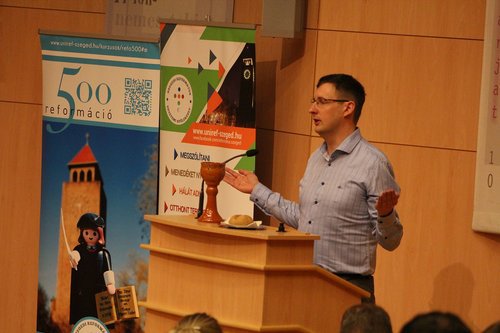
The university pastor spoke also about the fight that he feels, as if there were two massively different churches side by side, which do not want to take note of each other. “One church builds on its traditions and conventionality, and the other one does not want to take notice of the roots of the church. These two trends even do not talk to each other. This is not good, we have to change. I hope that the message of ÁrAdás will grow in communities, where it can loosen these tensions.”
To become an example
“My faith was reinforced by the meeting,” says Péter Vozáris, a university student who is the band frontman of the community of the Reformed University Chaplaincy in Debrecen at Böszörményi út. He says he was reminded that God has aims with everyone. The large number of participants was important for him, too. “It was good to see that our faith and mind are common with so many people from so many places.”
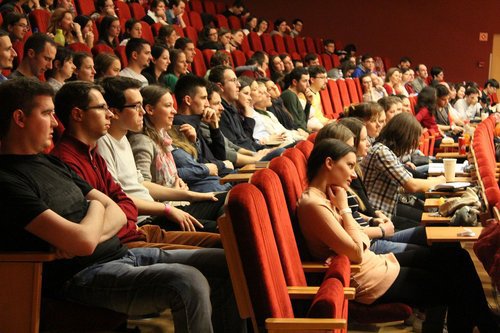
He says he knows from Father Feri Pál that, “first we should learn and appreciate ourselves, and after it we are able to tolerate, appreciate, and love other people. When I go home, I can strengthen other people in this way. If I am the good example because I am enthusiastic, I want to do something, I live for God- this weekend confirmed for me that I can build my own congregation in this way.”
The reformed church open doors for youth
The Reformed University Chaplaincy in Debrecen was one of the communities which sent the most participants to the gathering. According to Gergő Kovács, one of their pastors, ÁrAdás and other similar meetings are good because it refreshes young people to see others in their age range doing the same thing. It’s good if they feel that others keep the way of God like they do. “On this kind of occasion we realize that God allocated us in different points in the Carpathian Basin in order to be the salt and the light of the world.”
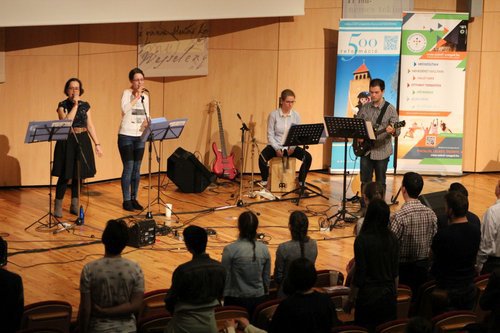
Often, even these campus communities can feel small and lonely at times, even if 150 or more people attend a church service there, because if this number is compared to the whole student body at the university, the membership of the congregation is about one per cent correlated to the whole university students’ community. Meetings like this, however, tell the members of campus congregations that they are not alone.
“In which field should the Reformed University Chaplaincy in Debrecen be renewed?” I ask pastor Gergő Kovács. According to him, you can renew as a person and also as a community during service. They are preparing in this spirit for the Reformed Youth Meeting, Csillagpont, in this summer, where they will be actually hosts. “We want to actively attend Csillagpont and we would like young people to feel that the reformed church is their church, which opens doors for them to find a home, to find answers for their questions and the challenges in their lives, to live pleasantly and to their fullest, and be able to develop on the way of Jesus.”
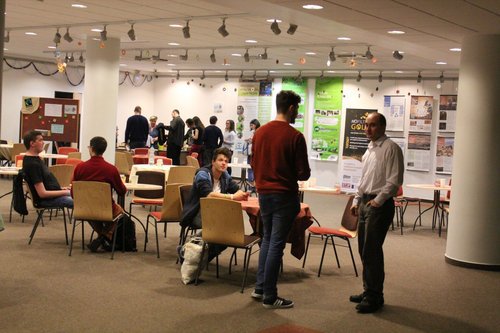
Délvidék takes an example
Gábor Stanyó, the instructor of the Hungarian reformed Dormitory, Apáczai, also took part in the ÁrAdás meeting. He says his sense of work and mission were reinforced. They want to conduct a more active mission among the reformed university students, but they are small in numbers. “We would like to build a similar reformed youth community in Vajdaság. Something has started because pastors organize meetings for young people twice or three times a year, but we are basically in another situation. It is not enough for us to launch a call for proposals because there are not enough susceptible people here. We have to find every university student who is Calvinist and who lives in Vajdaság, individually. Gábor Stanyó was looking for ideas and contacts about work like this at the meeting. He says that he learned a lot from good people: “I bring home their encouragement and perseverance as an example that we have to act and keep on.”
“They love being Calvinists”
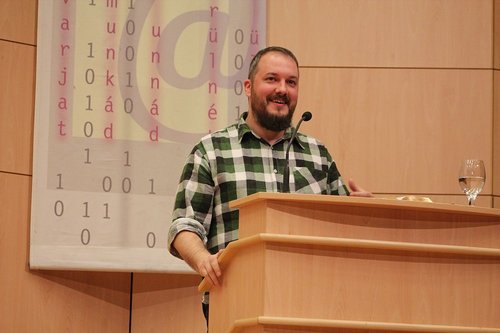
One of the executives of the ÁrAdás Reformed University Students’ Meeting in the Carpathian Basin was József Csomós Jr., youth pastor of Tiszáninnen. According to him, these occasions are needed for, “wondering about each other and learning: there are young believers, who want to take part in the life of their communities and to build the country of God- this is a process that strengthens us.”
The pastor also said that while a lot of people are sounding the alarm because it seems like we are running out of attendees, however, we see that the community does not die; it just it changes its form and revives. During our conversation, József Csomós Jr. emphasises again and again that God is the Lord of history, and he would not like to take away the direction of God in the current situation in the world. “I would like to see this story: it is possible that the reformed church loses small watchtowers in the country, but meanwhile in the cities it is building. I am grateful to God that so many people moved for the call of the Reformed University Chaplaincy in Szeged.”
According to the pastor of Tiszáninnen, if a youth does not find a home in their congregation, it is not always their fault because in some cases the preaching is not for them, they do not get an answer to their questions, and they do not feel comfortable there; music can play a role in this as well. But József Csomós Jr. does not believe that young people only like Anglo-Saxon melodies. According to him, “they sang the glorifying songs in the meeting as enthusiastically as the ancient reformed psalms”. He said that people who serve in churches have to note the migration within the church. Young people go from village congregations to the city, and from there they then often go abroad. So it is possible that a pastor in a village will teach a youth, but then they will leave and become active members in another community in another city in Hungary or even in a foreign city – but many pastors can resent this. “We have to stop jealousy and being controlling. We do not hoard this knowledge and these people for ourselves, but for Jesus, who has a wider view and conception than us.” The executive also emphasized that the attendants love being Calvinists.
After church to appearance
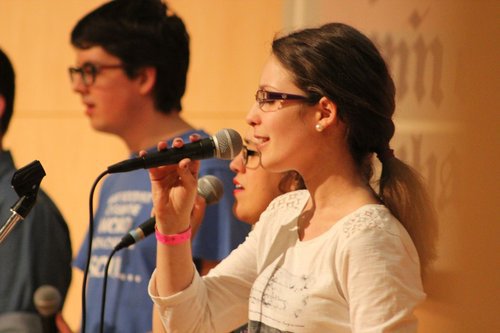
One of the guests at ÁrAdás was Misi Mező, the singer of Magna Cum Laude, who spoke about his revival and his faith in God in a touching and honest way. Sándor Szenczy, the President of Baptist Charity Aid, helped him change his life. He met him at a press conference and the following day they went together to the morning show of a commercial channel to speak about the Advent shoe-box concert of the Charity Aid. At the time he was outraged because of the interview, he was in a mood, but after that they had a nice conversation and set out to work together. On 14 November 2013 they brought donations together and talked in the car. Misi Mező says that he went home like on any other day, but he “got out of bed as another man.”
Misi Mező was revitalised. What changed in his life? Everything, he said. His family felt the change at first, his wife got a new husband, his son Nimród, a new father. There were changes in the band too – for instance, he has never sang one of his popular songs again because he cannot relate to it anymore. He said to his band mates that it is not compatible with his values. He told them at a meeting that he didn’t want to play shows on Sundays anymore, but they cannot achieve it every time. As the band sustains sixteen families, he makes compromises. It does not prevent him from church service.
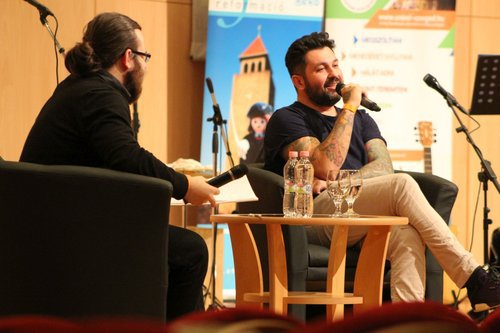
Misi Mező also said that he does not care about how others think he should live his life, so his life is now calmer. But he does care about what God thinks of him and his life, so he took on this conversation in Szeged. He said to Sándor Szenczy that there are four things needed to live in faith: praying, reading the Bible, finding themselves a congregation where they feel goodk, and telling everybody how God has changed their life. He came to ÁrAdás because of the last one.
Fair coffee
The meeting in March included a variety of programs for young people to participate in. Those in attendance could try a dragon boat, do sports, and taste coffees, too. The secretary general of Association Védegylet, Györgyi Újszászi, said that the participants on the meeting could taste coffees that are from a fair economy, so-called Fair Trade. Workers on these coffee plantations were not exploited and they received proper salaries, with women making just as much money as men. They also do not exploit the area to plant coffee in every free place, so the locals still have earth to produce their own food. On many regular coffee plantations children are employed, sometimes even by force, and the fair trade movement wants to do something about this too. Fair Trade currently makes up one per cent of coffee, tea and chocolate trade in the world. Györgyi Újszászi has the experience that worshippers have a large sense of responsibility in general, and that is why they find it important to promote fair trade products at ÁrAdás too.
Written by Márk Hegedűs
Photo by Csilla Kapás
Translated by Petra Kecskés
Edited by Kearstin Bailey